Ted Piccone: U.S. policy toward Cuba has long been a combination of grand gestures and small technicalities. Ever since Washington imposed a comprehensive embargo in 1962, which Congress codified in 1996 (with some exceptions), the regulatory details of what is and is not permissible have consumed endless hours of labor for lawyers and travelers alike. President Obama’s decision to relax the embargo where possible eased some of those regulatory burdens, opening the door to a raft of new bilateral agreements, exchanges and business deals.
President Trump’s announced “cancellation” of Obama’s approach to Cuba emphasizes enforcement of the embargo itself, particularly the ban on tourist travel and on financial transactions with Cuban enterprises controlled by the military and security services and with a broader class of Cuban government officials. The administration is now turning to revising the regulations yet again to reflect these changes.
The following commentaries by experts in Cuba and the United States raise a number of points that the regulators will want to take into account as they go about their work over the next 90 days. As the saying goes, the devil is in the details.
Ted Piccone—Senior Fellow, Latin America Initiative, Project on International Order and Strategy: President Trump’s symbolic act of reclaiming Cuba policy on behalf of his die-hard anti-Castro fans proves yet again that U.S. policy towards Cuba is determined almost exclusively by domestic politics in swing state Florida. Surrounded by Senator Marco Rubio and other luminaries of the pro-embargo Cuban exile establishment, Trump extolled their sacrifices on behalf of a free Cuba in a Miami pep rally that was pure retail politics.
He did so, however, not by trying to paint Cuba as a national security threat to the United States, as others have done in the past. Instead he went full throttle for the fundamental bargain Congress adopted when it codified the embargo in 1996: abandon communism and give your people their inalienable political and civil rights to choose who governs them, then we will lift the embargo.
The United States treats no other government in the world this way. What makes Cuba different from countries such as North Korea, Saudi Arabia, or Iran, where systemic human rights violations prevail? These states all pose major security challenges to the United States in a way that Cuba has not since the wave of democracy spread across Latin America in the 1980s and the Soviet Union collapsed. Yet these repressive states do not face the comprehensive decades-long blanket of sanctions that Cuba has endured since 1962. And Trump (and Secretary of State Tillerson) has made clear he has no real interest in defending human rights. In some sense, Cuba policy is caught in a time warp between the old ways of ostracizing a state Washington dislikes by unilaterally punishing its entire population, and newer tactics such as targeted multilateral sanctions that have yielded some progress in places like Myanmar and Iran.
What really makes Cuba exceptional is that it faces an organized, well-financed political machine of angry exiles in vote-rich Florida that extracts certain demands from political leaders for its votes. Though majorities of Cuban-Americans, in addition to both Republicans and Democrats, support President Obama’s reopening of diplomatic relations with Havana, Trump’s conviction that he won Florida thanks to his deal with Rubio and the hardliners is driving Cuba policy for everyone. No other faction so exclusively focused on one foreign country has such concentrated political influence on foreign policy, except perhaps for pro-Israel voters who, nonetheless, are more electorally dispersed. The majority who want to support the Cuban people through principled engagement and dialogue don’t seem to count.
As satisfying as Trump’s largely symbolic reversal of Obama’s more constructive approach may feel to Miami, a return to the past is unlikely to achieve its aims of overthrowing the Castros and empowering the Cuban people to finally claim the human rights they deserve. In fact, a hard-line approach from Washington/Miami is more likely to embolden the hardliners in Havana and make life more difficult for the civil society leaders, religious groups and private entrepreneurs it purportedly wants to help. The Cuban government’s initial reply to Trump’s show in Little Havana made very clear that it will not make any concessions regarding its socialist system of government. The 55-year stalemate lives on.
Carlos Alzugaray Treto—Independent Political Analyst, Havana, Cuba: Trump’s announcement of a “new” policy for Cuba in a Miami rally, reminiscent of the Cold War, is merely a halfway attempt at reviving a failed policy.
Although Cuba has generally been able to adapt to changes in U.S. policy, from Carter to Reagan and again from Clinton to Bush, the government’s pragmatic, but firm, position against any concession on the basis of sanctions has remained consistent. However, the current policy change differs from previous U.S. policy swings in that it does not completely do away with its predecessor: While Trump’s policy shuts down business transactions with Cuban entities affiliated with the Cuban military (and restricts individual people-to-people travel to the island), Cuba will continue to cooperate with U.S. institutions to the extent possible. That cooperation, no matter how minimal, will enable normalization to continue over the next three and a half years, although certainly at a much slower pace.
Trump’s decision, pending the new regulations, will certainly impact the embryonic travel and business activities established under President Obama. Since Obama only marginally allowed travel and business, the only thing that Trump can do is marginally decrease them. However, three factors will remain true. First, it is impossible to separate the private sector from the state sector, especially the so-called military enterprises. Second, travel, especially individual travel, fundamentally benefits the private sector. Third, the market will nimbly work around regulatory loopholes where found.
Roberto Veiga González—General Coordinator, Cuba Posible: This presidential directive reveals a regrettable point of view. However, the policy itself (although based on the erroneous logic that coercion will produce policy change in Havana) fails to reverse the process of normalization, as it does not significantly interrupt the relations reached during the last two years. This has been possible thanks to the efforts of many Americans and Cuban Americans. Maintaining these relations will depend on pro-engagement parties actively pushing continued normalization. In view of this, we must all make a greater effort to maintain existing relations, restore what is affected by the new policy directive, and develop bilateral links beyond what was achieved during the last stage.
Facilitating opportunities for dialogue between the pro-normalization camps of both countries and their respective governments will be essential to advancing the bilateral agenda. Another key component should be the intensification of bilateral relations in all areas that are still possible, to achieve our shared goal of increasing the well-being of every Cuban. Cuba must also focus on accelerating comprehensive economic and political reform of its social model. This would help make Cuba less vulnerable to external attacks on its governance model.
The island’s society is a set of integrated economic and social relations and, therefore, it is impossible to damage one element without also harming others. However, changes need to be made, because Cuba’s current model constrains development. There are a range of legitimate opinions and options that must be considered for how to further develop Cuba’s socio-political model.
Richard Feinberg—Nonresident Senior Fellow, Latin America Initiative: President Trump’s clownish, red-meat speech to the aging remnants of the Bay of Pigs fiasco should not mislead us into believing—as much of the media did—that Senator Marco Rubio re-wrote Cuba strategy. On the contrary, there’s much more policy continuity than change. The real victors were the professional bureaucrats who had come to believe, after an initial skepticism, that the Obama innovations were serving the U.S. national interest. So the embassies will remain open and the technical MOUs will remain in force, the commercial airlines will continue to fly and the cruise ships will continue to sail. There will be some marginal tightening of authorized travel—the detailed regulations are yet to come—but Obama’s 12 travel categories remain operational. Despite the new ban against the military-controlled Gaviota tourism holding company, U.S. travelers will presumably still have access to the Ministry of Tourism chains (Gran Caribe, Cubanacan), including such favorites as the Hotel Nacional, Parque Central, Melia Cohiba and Melia Habana, Riviera and Inglaterra. Non-U.S. travelers will fill the Gaviota accommodations.
This prohibition against doing business with military-controlled enterprises is an attempt at targeted sanctions. However, the oft-repeated notion that the military controls some 60 percent of the economy is unfounded, as Cuban state enterprises do not publish their financials. Fact is, very few U.S. firms have inked business deals outside the tourism sector, consequent to the maze of Helms-Burton restrictions and Cuban bureaucratic foot-dragging. Ironically, once the U.S. Treasury publishes the full list of prohibited firms, U.S. companies may feel freer to sign contracts with the remainder, in promising civilian-dominated sectors such as energy, agriculture, and bio-technology.
Harold Cardenas Lema—Blogger, La Joven Cuba: In recent years, Cubans have experienced renewed hopes for a mutually beneficial rapprochement with the United States. However, President Trump is threatening to reverse that process with a policy of isolation instead of engagement. Such a policy appeals to Miami hardliners who are willing to harm both nations’ interests in order to exact revenge on the Cuban government.
In Cuba, however, the announcement had the effect of uniting the public and the government against the new U.S. policy, with people taking to the streets to express their disappointment. If the Trump administration’s goal truly is a regime change in Havana, this announcement is moving Cuba in the opposite direction.
A crowd roaring “USA” followed by a violinist playing the Star-Spangled Banner isn’t the way to appeal to the Cuban people. Cuba has a lot of experience with this president’s brand of hostility. Sadly, every time a U.S. president takes this posture, the nation goes on the defensive, Cuban civil society is weakened, and efforts to address internal challenges are postponed once again.
Despite the strong rhetoric of the recent announcement, most of the Obama policies remain in place and a bilateral agenda for cooperation still exists. Hopefully, the end of the Trump administration will also mark the end of the last remnant of the Cold War, even if one more year of the embargo is one year too much.
Ricardo Torres Pérez—Professor of Economics, University of Havana: The new version of U.S. policy toward Cuba announced by President Trump on June 16 has at least three relevant dimensions.
First, it was an act charged with symbolism, a gesture toward the hard line of the Cuban-American community, which is very well represented in U.S. policy.
Second, the areas proposed for change are not merely symbolic. One must take into account that even during the Obama era, the main aspects of the U.S. embargo remained in effect. But advances were achieved that signified an inflection point. Under the Trump proposal, however, tourism and various other sectors subject to new sanctions (logistics, hospitality, finance) are key activities for the Cuban economy. Tourism, where the private sector now occupies a noteworthy position, is particularly sensitive because it is an industry that generates certain linkages and spillovers toward the Cuban family, which has no contemporary parallel in Cuba’s economy and which cannot be fully appreciated in the official statistics.
Similarly, any regulation that limits remittances can also have a significant effect on the income of many households. In any event, whether in the travel or general business categories, the impact on the confidence of third parties (visitors and businesses from other countries) will have to be monitored, keeping in mind that U.S. travelers represent only a little more than 7 percent of total arrivals to Cuba in 2016 (although they spend more than average).
The third dimension is that one will have to wait for the translation of this discourse into concrete regulations. It could be implemented very harshly, or the contrary. Here, perhaps, the key will be to understand whether the motive of Trump’s speech to be a simple gesture or something more. It will be very important for both governments to be pressured to clarify that everything else will continue functioning as it has up to now. In cases like this, it is critical to keep channels of communication open, even if the conversation is less cordial.
One is inclined to think that, although it may be a step backwards that goes a bit beyond symbolism, not all is lost and there is space for negotiation.
The Brookings Institution is committed to quality, independence, and impact.
We are supported by a diverse array of funders. In line with our values and policies, each Brookings publication represents the sole views of its author(s).

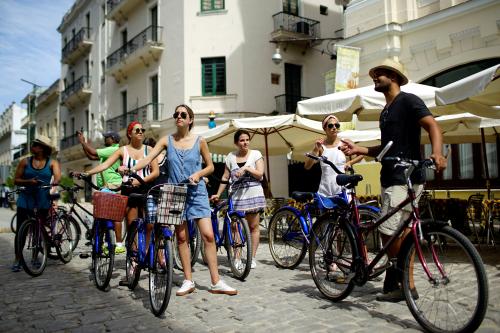
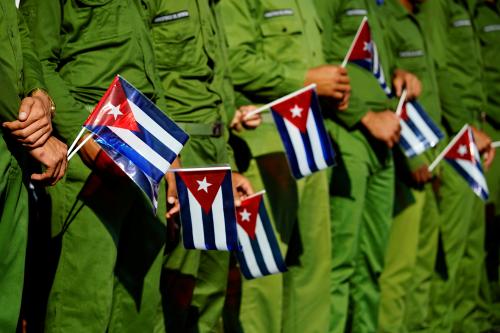


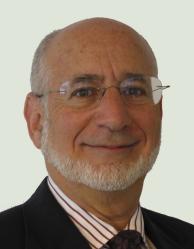

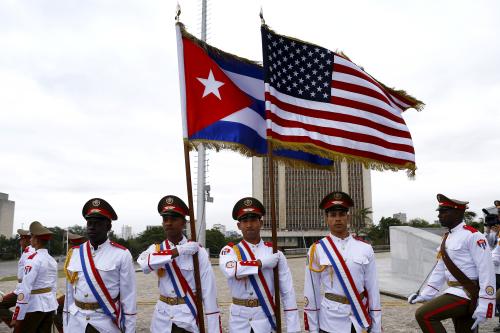
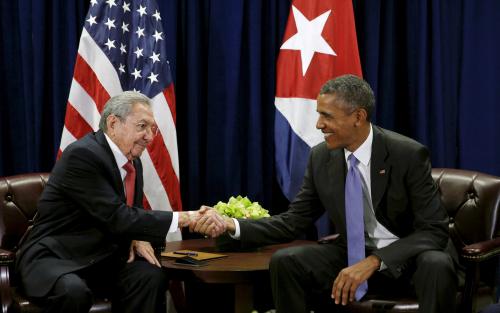
Commentary
Reactions to Trump’s policy on Cuba
June 20, 2017